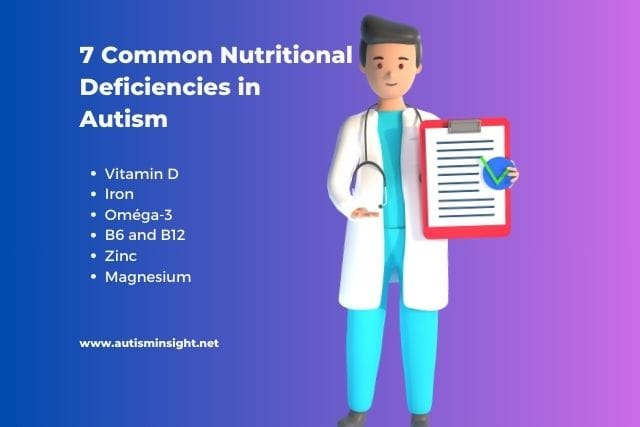Autistic individuals may face specific challenges when it comes to nutrition, partly due to selective eating, sensory sensitivities, and restricted diets. These factors can lead to nutritional deficiencies that impact their physical and mental well-being. In this article, we will explore the most common nutritional deficiencies in autism, their causes, and possible solutions to prevent and address them.
Table of Contents
1. Most Common Nutritional Deficiencies in Autistic Individuals
The most common nutritional deficiencies in autistic individuals include deficits in vitamin D, iron, calcium, vitamin B12, zinc, magnesium, and omega-3 fatty acids. Each deficiency has specific impacts on health, but they are often interconnected and can manifest as similar symptoms, such as fatigue, muscle weakness, and cognitive issues.
1.1 Iron Deficiency
Iron deficiency is common in autistic individuals, often due to selective eating habits and a preference for iron-poor foods like carbohydrates. This deficiency can lead to iron-deficiency anemia, which manifests as fatigue, irritability, and concentration issues.
Food Sources:
- Red meat (beef, lamb)
- Legumes (lentils, chickpeas)
- Spinach and leafy green vegetables
1.2 Vitamin D Deficiency
Autistic children and adults are more likely to suffer from vitamin D deficiency due to limited sun exposure and a diet low in fortified foods. A deficiency in vitamin D can affect the immune system and exacerbate anxiety, depression, and other symptoms.
Food Sources:
- Fatty fish (salmon, mackerel, sardines)
- Fortified dairy products
- Egg yolks
1.3 Omega-3 Fatty Acids Deficiency
Omega-3 fatty acids are essential for brain development and emotional regulation. Many autistic individuals have a diet low in omega-3s because they avoid fatty fish and nuts.
Food Sources:
- Fatty fish (salmon, sardines)
- Flaxseeds and chia seeds
- Walnut and olive oil
1.4 Zinc Deficiency
Zinc plays a key role in immune system function, cell growth, and mood regulation. Autistic individuals may be particularly vulnerable to zinc deficiency because zinc-rich foods may be rejected due to texture or taste preferences.
Food Sources:
- Red meat (beef, lamb)
- Seafood (oysters, shrimp)
- Pumpkin seeds and nuts
1.5 Vitamin B6 Deficiency
Vitamin B6 is crucial for the production of neurotransmitters involved in emotion regulation, such as serotonin and dopamine. A deficiency in vitamin B6 can worsen behavioral and emotional symptoms in autistic individuals.
Food Sources:
- Meat (chicken, turkey)
- Potatoes
- Whole grains and bananas
1.6 Vitamin B12 Deficiency
Vitamin B12 is essential for the production of red blood cells and the health of the nervous system. Autistic individuals following vegetarian or vegan diets may be at a higher risk of vitamin B12 deficiency.
Food Sources:
- Animal products (meat, fish, eggs, dairy)
- Fortified foods (cereals, plant-based milks)
1.7 Magnesium Deficiency
Magnesium plays a role in managing stress and anxiety. A deficiency in magnesium can lead to sleep disturbances, increased anxiety, and muscle problems. Autistic individuals, particularly those with selective eating behaviors, may be at risk for this deficiency.
Food Sources:
- Nuts and seeds (almonds, sunflower seeds)
- Legumes (beans, peas)
- Leafy green vegetables (spinach, kale)

2. Causes of Nutritional Deficiencies in Autistic Individuals
Nutritional deficiencies in autistic individuals can be caused by several factors, ranging from selective eating to sensory disorders that make it difficult to consume a varied and balanced diet.
2.1 Selective Eating
Selective eating is common in autistic individuals, where they only eat a limited number of foods, often due to texture, taste, or color preferences. This often leads to specific deficiencies, such as iron or vitamin D deficiency.
2.2 Sensory Sensitivities
Many autistic individuals experience sensory sensitivities, which make it difficult to accept certain food textures. For example, soft or starchy foods may be preferred, while vegetables or meats may be rejected, increasing the risk of deficiencies.
2.3 Restrictive Diets (SGSC)
Gluten-free and casein-free diets (SGSC) are popular among some families with autistic children, hoping to reduce symptoms of autism. However, these diets can lead to nutritional deficiencies if not properly balanced.
3. How to Identify and Diagnose Nutritional Deficiencies
Nutritional deficiencies can be subtle, but it is important to watch for symptoms such as:
- Excessive fatigue
- Sleep disturbances
- Skin problems (dryness, rashes)
- Irritability or agitated behaviors
3.1 Health Check-ups and Tests
Regular health check-ups are essential for detecting nutritional deficiencies. Blood tests can measure levels of vitamins and minerals, helping diagnose specific deficiencies.
4. Practical Solutions to Address Nutritional Deficiencies
To prevent and treat nutritional deficiencies in autistic individuals, several strategies can be implemented. These solutions aim to improve diet and offer alternatives when necessary.
4.1 Improve Daily Diet
It is essential to introduce varied and nutrient-rich foods into the diet of an autistic child or adult. By using adapted recipes, meals can be enriched with essential nutrients.
| Nutrient | Recommended Foods | Recommended Daily Amount |
|---|---|---|
| Iron | Red meat, spinach, lentils | 10-15 mg for a child |
| Vitamin D | Fatty fish, fortified milk | 600 IU for a child |
| Omega-3 | Fatty fish, flaxseeds | 1-2 g of omega-3 |
| Zinc | Red meat, seafood | 5-10 mg for a child |
| Vitamin B6 | Meat, potatoes | 1-2 mg for a child |
| Vitamin B12 | Animal products | 2-3 mcg for a child |
| Magnesium | Nuts, leafy greens | 80-100 mg for a child |
4.2 Use of Supplements
In some cases, dietary supplements may be necessary to fill in nutritional gaps. Vitamins and minerals in pill or liquid form can complement an insufficient diet but should always be used under medical supervision.
4.3 Consult a Dietitian
A dietitian specializing in autism can provide a personalized nutrition plan, taking into account food preferences and sensory sensitivities. This ensures nutritional needs are met without sacrificing the individual’s food preferences.
5. Prevention of Nutritional Deficiencies in Autistic Individuals
Preventing nutritional deficiencies is crucial for ensuring long-term physical and mental health. Here are some preventive measures.

5.1 Promote Healthy Eating Habits
Encourage a healthy diet by gradually introducing nutrient-dense foods. Use meal preparation techniques to make foods more appealing and acceptable to the autistic individual, considering their sensory preferences.
5.2 Create Positive Eating Environments
A calm and pressure-free environment during meals can help autistic individuals focus on eating. This can include creating a pleasant atmosphere, structured mealtimes, and minimizing distractions.
5.3 Educate Families and Caregivers
Educating families and caregivers about the importance of nutrition is critical. Understanding the specific nutritional needs of autistic individuals and providing proper follow-up can help prevent deficiencies.
6. Case Studies: Addressing Nutritional Deficiencies in Daily Life
To better understand the impact of nutritional deficiencies and possible solutions, here are some practical case examples.
6.1 Case of an Autistic Child with Zinc Deficiency
Léna, a 6-year-old autistic child, has always been selective about food. She mainly eats pasta and bread but refuses vegetables and fruits. Her parents noticed she became easily irritable and had recurring infections. A blood test revealed a zinc deficiency. By adding pumpkin seeds and nuts to her daily diet and gradually introducing more balanced meals, the symptoms were significantly reduced.
6.2 Case of an Autistic Teenager with Vitamin B12 Deficiency
Marc, a 15-year-old autistic teenager, followed a strict vegetarian diet for several years. He complained of constant fatigue, concentration issues, and muscle pain. A test revealed a vitamin B12 deficiency. By adding B12-rich foods and dietary supplements, his energy levels and concentration improved.
Conclusion: The Importance of a Balanced Diet for Autistic Individuals
Nutritional deficiencies are common in autistic individuals, but they can be identified and corrected with proper interventions. Medical follow-up, a balanced diet, and addressing the specific needs of autistic individuals can help prevent and treat these deficiencies effectively. Through targeted nutritional strategies, it is possible to improve the health, well-being, and quality of life of autistic individuals.
General Recommendations:
- Consult a healthcare professional: A dietitian or a doctor specializing in autism can offer personalized advice.
- Encourage a varied diet: Introduce a variety of nutrient-rich foods into the diet.
- Regularly monitor nutrient levels: Regular health check-ups and blood tests can help detect deficiencies early.
Discover also Our post: How a Food Journal Can Help Identify Triggers and Their Behavioral Effects
External link: GiKids – General Nutrition and Autism
“This article provides general information; it is important to consult a nutritionist specialized in ASD for your specific case, as each case is unique.”

Pingback: Hair Test for Nutritional Deficiencies – Is It Accurate?